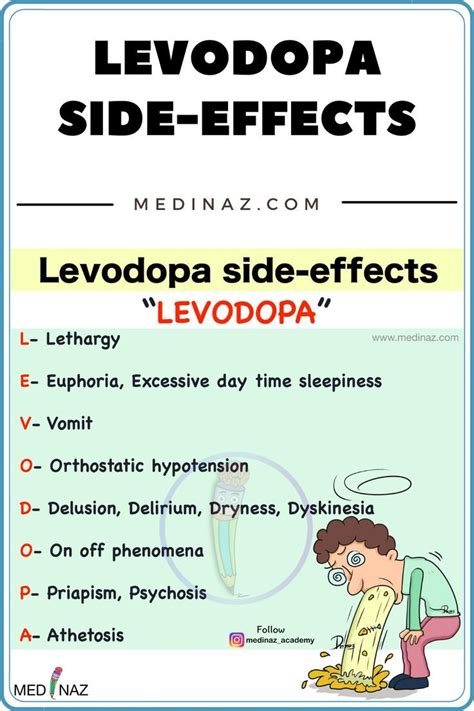Levodopa, commonly prescribed in combination with carbidopa, is a cornerstone treatment for managing Parkinson’s disease symptoms. By increasing dopamine levels in the brain, levodopa helps alleviate symptoms such as stiffness, tremors, and difficulty with movement. However, like all medications, levodopa can have side effects, some of which can be significant. Understanding these potential side effects is crucial for patients to manage their treatment effectively and maintain the best possible quality of life.
Common Levodopa Side Effects
- Nausea and Vomiting: Many patients experience nausea, especially when first starting the medication. This side effect can often be managed by taking the medication with food or adjusting the dosage.
- Dizziness and Lightheadedness: Changes in blood pressure can lead to dizziness, particularly when standing up from a sitting or lying down position. Patients are advised to rise slowly and hold onto something for support if needed.
- Dyskinesia: These are involuntary, erratic movements that can occur as a result of long-term levodopa use. They can be quite distressing and may require adjustments in medication.
- Vivid Dreams or Nightmares: Some patients report having very vivid dreams or nightmares, which can be disturbing but are generally not a cause for concern.
- Insomnia: Difficulty sleeping can be a side effect, possibly due to the medication’s effect on neurotransmitters in the brain.
- Mood Changes: Patients might experience mood swings, depression, or anxiety. It’s essential to monitor mood changes and discuss them with a healthcare provider.
- Orthostatic Hypotension: A drop in blood pressure upon standing can lead to dizziness or fainting. Staying hydrated and making slow movements can help manage this condition.
- Confusion: Especially in older adults, levodopa can cause confusion or hallucinations, which might require a reassessment of the medication regimen.
Less Common but Serious Side Effects
- Melanoma Risk: There has been some concern about a potential increased risk of developing melanoma, a type of skin cancer, in patients taking levodopa. Regular skin checks are recommended.
- Impulse Control Disorders: A small number of patients may develop impulse control disorders, including compulsive gambling, binge eating, or hypersexuality. These behaviors can be distressing and require immediate medical attention.
- Neuropsychiatric Symptoms: Hallucinations, paranoid ideation, and psychosis can occur, particularly in elderly patients or those with a history of psychiatric disorders.
- Augmentation: In patients with restless legs syndrome, levodopa can sometimes worsen symptoms over time, a phenomenon known as augmentation.
Management of Side Effects
- Dose Adjustment: Often, side effects can be managed by adjusting the dosage of levodopa. Finding the right balance is key to minimizing side effects while controlling Parkinson’s symptoms.
- Combination Therapy: Adding other medications can help reduce side effects and improve symptom control. Dopamine agonists, COMT inhibitors, and MAO-B inhibitors are commonly used in combination with levodopa.
- Lifestyle Modifications: Regular exercise, maintaining a balanced diet, and staying hydrated can also help in managing some of the side effects.
Conclusion
While levodopa is highly effective in managing Parkinson’s disease, its side effects must be carefully considered and managed. Open communication with healthcare providers is essential to adjust treatment plans as needed and to mitigate side effects. By understanding the potential side effects and working closely with medical professionals, patients can maximize the benefits of levodopa therapy while minimizing its drawbacks.
How do I manage nausea when taking levodopa?
+Nausea can often be managed by taking levodopa with food. Discussing dosage adjustments with your healthcare provider can also help mitigate this side effect.
Can levodopa cause addiction?
+Levodopa itself is not typically considered addictive, but it can lead to impulse control disorders in some individuals, which may resemble addictive behaviors.
How can I differentiate between Parkinson's symptoms and levodopa side effects?
+Keeping a symptom journal can help identify patterns and distinguish between disease symptoms and medication side effects. Regular communication with your healthcare provider is also crucial for making this distinction.
Can I stop taking levodopa if I experience side effects?
+No, you should not stop taking levodopa without first consulting your healthcare provider. Abruptly stopping the medication can lead to a worsening of Parkinson's symptoms. Your provider can help adjust your treatment plan to manage side effects.
Are there any dietary restrictions I should follow while taking levodopa?
+Certain foods, particularly those high in protein, can affect how levodopa is absorbed by the body. Discussing dietary advice with your healthcare provider or a nutritionist can help optimize your treatment.
By being proactive and informed, individuals taking levodopa can better navigate its potential side effects, ensuring they receive the maximum benefit from their treatment while maintaining a good quality of life.



